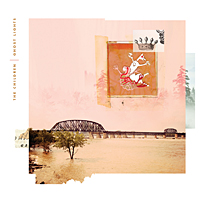|
ARTISTS THE CHILDREN In 2003, I was new to town and freelancing for the local alternative weekly. It didn't take long for me to realize that  there was a lot more going on here than hardcore punk and bluegrass jams. One night, at a dingy, quasi-legal warehouse party, I saw aspacy, instrumental dub reggae band called The Children. there was a lot more going on here than hardcore punk and bluegrass jams. One night, at a dingy, quasi-legal warehouse party, I saw aspacy, instrumental dub reggae band called The Children.
Everybody there that night knew that The Children got it. Not “got it” for Kentucky. Not “got it” for a new band influenced by old bands. They just GOT IT. They understood what they were doing, it was something new and they were talented enough to pull it off. There were other bands that were being influenced by Krautrock and post-punk sounds, but The Children combined those sounds with least obvious reggae references possible. They paid homage to Augustus Pablo’s stoic melodica, Tommy McCook’s dubbed-out sax and the blasting bass of the all-but-forgotten American reggae label Wackies. These Kentuckians even had the gall to riff on the reggae sub-genre nyabinghi. The Children’s existence should have surprised no one. Louisville’s mind had been opened by Slint and Rodan in the 1980s in such a way that bands could experiment with completely under-appreciated genres and not be run out of town. In this setting, The Children were embraced. They opened for acts as varied as Trans Am, Sun Ra’s Arkestra, Roy Campbell, !!! and Parlour. The heart of the band was Gary “Basil” Bromley. He was the bass player for influential British indie band Dif Juz, who were one of the first bands to build on PIL’s dub-punksound. Back in 1980, they signed with 4AD. Eventually, they even recorded with reggae icon Lee “Scratch” Perry. Sadly, they may have been a little too ahead of their time. They disintegrated in the mid-1980s and it wasn't until post-rock emerged in the late 1990s that their combination of echo-laden psychedelic guitars and a driving low-end would find audiences. Bromley's bass and David Wright’s drums kept the band grounded. The other band members were free to improvise. Mac Finley’s guitar could alternate between catchy melodies and shimmering washes of reverb and delay. It’s in Mac’s work that you can most easily hear the echoes Neu! or Can. Eddie Campbell was a blazing multi-instrumentalist. Depending upon the song, he would play sax or melodica or support the rhythm section with additional percussion. And back at the sound board, Tyler Trotter would drop in samples and add effects to the instruments. By the end of the decade, internal conflicts and evolving obligations made The Children impossible to sustain. However, they left behind enough to make up the ten tracks of their posthumous album "Ghost Lights". Personal favorites include the rhythmic jams “Train Dub” and “Ghost Lights” or the slightly more punky “Fuzzy Glass.” For a band that could seemingly bring an entire studio to every performance, the songs on the album are relatively unembellished. Instead, what you have is a faithful document of a fantastic and much-missed live band. Alan Abbott Listen to "Train (Dub)" HERE. Order "Ghost Lights" HERE. |